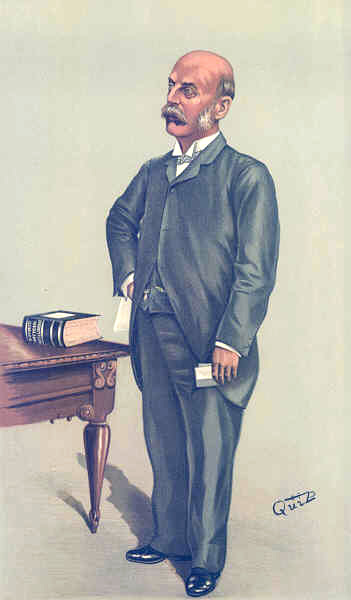A man of many parts with boundless
energy, Burdett began his working life in a bank, but at the early age of
twenty-one he was appointed hospital superintendent to the Queen's Hospital,
Birmingham. He came to be well known to Joseph Chamberlain (Mayor of Birmingham
1873-5) who was notable for combining effective social reform with sound
business principles. Having
virtually doubled the income of Queen's Hospital in six years, he became house
governor to the Seamen's Hospital, Greenwich, where he again revitalised the
hospital, attracted new funds and trained a number of young but rising
administrators. Though lacking the time to take finals, he entered himself as a
medical student at Guy's and so impressed those he met that he was appointed
secretary to the Shares and Loan Department of the London Stock Exchange in
1881, leaving Greenwich.
Having
virtually doubled the income of Queen's Hospital in six years, he became house
governor to the Seamen's Hospital, Greenwich, where he again revitalised the
hospital, attracted new funds and trained a number of young but rising
administrators. Though lacking the time to take finals, he entered himself as a
medical student at Guy's and so impressed those he met that he was appointed
secretary to the Shares and Loan Department of the London Stock Exchange in
1881, leaving Greenwich.
His book, Prince,
Princess and People, a sketch of social progress
exemplified by the work of the Prince of Wales (later Edward VII) attracted
influential attention. An active participant in the Social Science Association,
his organisation of the first hospital conference led to the establishment of
the Hospitals Association in 1884. He founded, in conjunction with the Hospitals
Association, a weekly journal, The
Hospital, which became his personal platform. He was one
of the earliest workers in the cause of Hospital Sunday, was the author of a
four volume classic Hospitals
and Asylums of the World (1893), and launched Burdett's Hospitals
and Charities - the Year Book of Philanthropy. This
became the leading annual reference book on hospitals and it appeared until the
1990s as the Health
Services Year Book.
As his reputation and influence
grew, he took the precaution of taking a shorthand writer to meetings with him,
for his blunt comments were sometimes misquoted. A governor of many hospitals,
his long and wide ranging experience of hospital administration and finance made
him a formidable adversary. He was interested in the development of the nursing
profession, writing a book to help girls wishing to enter nursing, and
establishing the Royal National Pension Fund for Nurses. He, and his journal,
supported the establishment view of his day that a register for nurses would be
disadvantageous, siding with Miss Nightingale and Miss Liickes against Mrs
Bedford Fenwick. His obituary in The
Lancet describes him as a kindly hospitable man whose
mind moved on large lines towards large objectives, but who could never subdue
the instinct for oratorial effect, the dramatic pause and gesture. His writings
and criticisms were robust, and those who did not measure up to his high
standards would find a caustic comment in The
Hospital. He therefore made enemies as well as friends.
Active in visiting hospitals and always sympathetic to appeals for advice, he
had no patience with inefficiency. While he believed that more men of
accomplishment were needed on hospital boards, those devoting themselves to the
noble cause of the hospitals had to give their all, as he did himself. For his
services he received first the KCB and later the KCVO.
Burdett recognised that hospitals
must demonstrate soundness and economy of management if they were to survive,
but he viewed them with something approaching reverence. `The concept of the
voluntary hospitals of this country constitutes one of the noblest monuments of
our Christian civilisation. We believe and hope that the day is far distant when
any serious attempt will be made to substitute State hospitals for the noble
medical charities scattered throughout England, charities which are at one and
the same time the wonder of foreigners and the just glory and pride of the
British nation.'
Sources:
Burdett H C. Lancet, 1897, ii, pp 1215-6.
Sir Henry Burdett. The Hospital, 1920, ii, pp 129-147.
 Having
virtually doubled the income of Queen's Hospital in six years, he became house
governor to the Seamen's Hospital, Greenwich, where he again revitalised the
hospital, attracted new funds and trained a number of young but rising
administrators. Though lacking the time to take finals, he entered himself as a
medical student at Guy's and so impressed those he met that he was appointed
secretary to the Shares and Loan Department of the London Stock Exchange in
1881, leaving Greenwich.
Having
virtually doubled the income of Queen's Hospital in six years, he became house
governor to the Seamen's Hospital, Greenwich, where he again revitalised the
hospital, attracted new funds and trained a number of young but rising
administrators. Though lacking the time to take finals, he entered himself as a
medical student at Guy's and so impressed those he met that he was appointed
secretary to the Shares and Loan Department of the London Stock Exchange in
1881, leaving Greenwich.